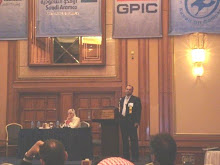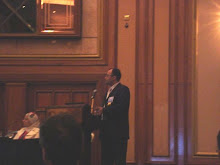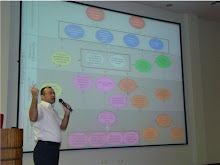Maturity reflects the current organizational competencies/practices level. It reveals how successful this organization can be in effectively running business and carrying out projects. The Six Stage Maturity Model (fig. 1) is based on the following six stages PMGT5876 (2004):
1. Foundation Stage
2. Garbage Can
3. Bureaucracy
4. Partnering
5. Empowerment
6. Network Organization

Figure 1: Six Stage Maturity Model
It is on this scale that organizations are assessed (1-6) according to the following eight criteria: Strategy, Management, Organization, Stakeholders, Contracts, Data, Systems and Processes and Technology.
While organizations develop, they progress through these stages. However the “strategic objectives” set by each organization will reflect its target upper maturity boundary.
As a complementary approach, since it is evident that Knowledge sharing is an essential pre-requisite for cultural developments, partnering, and alliance; therefore, we suggest adopting the RMMM (Relationship Management Maturity Model) that serves in aligning different units/divisions of the organization (Martin et al., 2006). It introduces a mechanism to bridge the cultural maturity gaps through an interpretive approach to knowledge sharing, defines knowledge sharing processes and emphasizes on the tasks of the “Relationship Managers” as facilitators of knowledge sharing and measuring the relationships’ maturities. The RMMM can furthermore be used to identify problematic issues and develop processes to address them.
These two maturity models should form the baseline of the change process in our organization upon which strategic decision and strategic change planning can build onwards.
About The Author

- Eng. Samer el Barakeh, MPM, PMP
- Samer el Barakeh was born in Lebanon, 1973. He completed his Bachelor in Engineering-CCE at Beirut Arab University-Lebanon in 1996 with honours. Samer was granted Masters Degree in Project Management (MPM) from the University of Sydney-Australia with honours. He also gained the Project Management Professional (PMP) Credential from The Project Management Institute (PMI). Samer is a member of the Order of Architects and Engineers in Lebanon since 1996, The Project Management Institute (PMI), Arabian Gulf Chapter (AGC-PMI) and Lebanon Chapter-PMI. During his 13 years of professional experience in Lebanon, Australia and Saudi Arabia, Samer held many positions among them: Telecommunication Site Engineer, Site Manager, Low Current Service Head, and he is currently Senior Systems Analyst at the General Project Construction Division. Samer is a Project Management Consultant and Training Provider for universal organizations like Business Management Consultants (USA) www.bmc-online.com and PMCTQuest (Canada) www.pmctquest.com Samer is a Registered Training Provider for Project Management Professional (PMP), and he provides training in Program Management, Portfolio Management,PMO...
Select a topic to view content
- A comparison between PMBOK and Prince2 Methodologies and reflection on case study examples (1)
- ABC to Avoid Project Failure (1)
- Business Case and Quantitative Benefits (1)
- Do we need more 'Planners' ? (1)
- Fasilitator in Partnering-A Coincise Shot (1)
- How to Ensure Stratgic Alignment of Our Projects? (1)
- Individual Dissimilarity and Team Work (1)
- Knowledge Management (1)
- Maturity Models-The Pros and Cons (1)
- Organizational Advantages from Partnering (1)
- Organizational Maturity: Lets Head Upwards... (1)
- Organizational Strategy and Project Alignement (1)
- Practical Solutions 1 of 6: Introduce RMMM (1)
- Practical Solutions 2 of 6: Facilitate Change to Perk up Maturity (1)
- Practical Solutions 3 of 6: Leverage Organisational Culture Barrier (1)
- Practical Solutions 4 of 6: Organisational Cultural Alignment (1)
- Practical Solutions 5 of 6: Defining a Unified Decision Making Tool (1)
- Practical Solutions 6 of 6: Understanding The Paradox of Control (1)
- Programme Management to Implement Strategy (1)
- Project Management and Construction Management (1)
- Project Managers relocated before Proper Project Closure and Learning Lessons (1)
- Project Managers' Power (1)
- Strategic Planning (1)
- Successful Project Management Office-PMO (1)
- System Thinking: Archetypes at Work... (1)
- The Partnering Change Process (1)
- The Upper Hand… Leadership skills or Processes? (1)
- Thinking about change needed? Maybe you should be more ‘worried’ about how to make it real (1)
- Vision Mission and Objectives What and Why? (1)
- What is meant by Portfolio and Programme Management (1)
- Why Partnering in Organizations? (1)
December 30, 2007
Organizational Maturity: Lets Head Upwards!
Posted by
Eng. Samer el Barakeh, MPM, PMP
at
1:58 PM
![]()
![]()
Subscribe to:
Post Comments (Atom)
Followers
All Titles
A comparison between PMBOK and Prince2 Methodologies and reflection on case study examples
ABC to Avoid Project Failure
Business Case and Quantitative Benefits
Do we need more 'Planners' ?
Fasilitator in Partnering-A Coincise Shot
How to Ensure Stratgic Alignment of Our Projects?
Individual Dissimilarity and Team Work
Knowledge Management
Maturity Models-The Pros and Cons
Organizational Advantages from Partnering
Organizational Maturity: Lets Head Upwards...
Organizational Strategy and Project Alignement
Practical Solutions 1 of 6: Introduce RMMM
Practical Solutions 2 of 6: Facilitate Change to Perk up Maturity
Practical Solutions 3 of 6: Leverage Organisational Culture Barrier
Practical Solutions 4 of 6: Organisational Cultural Alignment
Practical Solutions 5 of 6: Defining a Unified Decision Making Tool
Practical Solutions 6 of 6: Understanding The Paradox of Control
Programme Management to Implement Strategy
Project Management and Construction Management
Project Managers relocated before Proper Project Closure and Learning Lessons
Project Managers' Power
Strategic Planning
Successful Project Management Office-PMO
System Thinking: Archetypes at Work...
The Partnering Change Process
The Upper Hand… Leadership skills or Processes?
Thinking about change needed? Maybe you should be more ‘worried’ about how to make it real
Vision Mission and Objectives What and Why?
What is meant by Portfolio and Programme Management
Why Partnering in Organizations?

















No comments:
Post a Comment